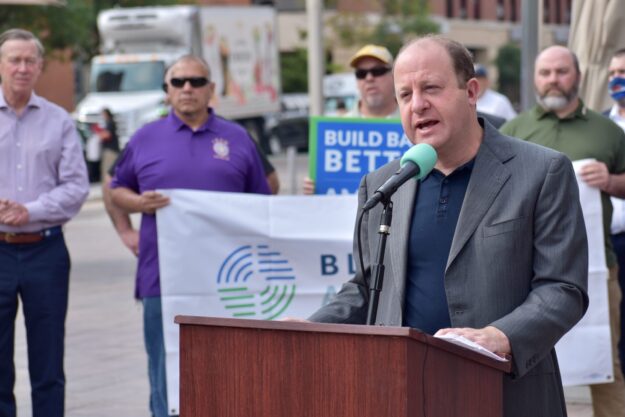Widgetized Section
Go to Admin » Appearance » Widgets » and move Gabfire Widget: Social into that MastheadOverlay zone
Polis cool to climate targets in Democratic bill meant to speed Colorado’s clean energy transition

For the third legislative session in a row, an effort by Democratic lawmakers to beef up Colorado’s approach to combating climate change is getting a cool reception from Gov. Jared Polis’ administration and industry groups.
Senate Bill 22-16, introduced this month by Democratic Sen. Chris Hansen of Denver, received its first hearing in the Senate Transportation and Energy Committee on Wednesday.
The bill proposes a wide-ranging set of reforms aimed at speeding up the state’s transition to clean energy, including changes to how carbon sequestration and electricity transmission projects are permitted. It would also commit Colorado to a net-zero greenhouse gas emissions target for the first time, and set interim goals at five-year intervals between 2030 and 2050.
Those targets are among the provisions in the bill that Polis administration officials expressed misgivings about in Wednesday’s committee hearing.
“We are concerned with the introduction of new greenhouse gas emissions reduction targets, specifically for the interim years and the change to the long-term 2050 target,” Keith Hay, senior director of policy at the Colorado Energy Office, told lawmakers.
Hay said that while the office supports interim targets in principle, state officials want more time to update their “roadmap” for emissions-cutting strategies, and could return to the Legislature to propose interim targets by the end of the year. It’s especially important, he said, for the state to study the potential impact of new federal tax incentives for clean-energy technologies like electric vehicles and home heat pumps.
“It is known, broadly, that transportation and buildings are going to be a challenge to decarbonize, and in part, that is because getting those emissions reductions requires individuals to make economic choices,” Hay said. “One of the things that we really want to understand before we set targets is what the incentives … will mean to customers as they look at making those choices.”
A representative of Xcel Energy, Colorado’s largest electric utility, echoed the administration’s call to strip the new interim targets from the bill.
“Any new climate policy we adopt must allow our economy to continue to grow as we want it to, and not add additional costs to customers by forcing a transition before technology is available,” Jeff Lyng, vice president of energy and sustainability at Xcel, told the committee.
Few legal consequences
For years, Polis, who won a resounding victory to secure a second term in November, has clashed with Democrats in the General Assembly over state climate policy, defending his administration’s flexible and “iterative” approach to cutting emissions. The conflict came to a head in a rare public spat in 2021, when the governor threatened to veto climate legislation that he said would give regulators “near-dictatorial control of our entire economy.”
By contrast, SB-16 — and a previous version that Hansen tried unsuccessfully to pass last year — would make no sweeping changes to the state’s approach. As under current law, failure to meet the statutory emissions goals would trigger few specific legal consequences or enforcement mechanisms.
In addition to permitting reforms, the bill would require large insurance companies operating in Colorado to better assess climate risk, and would direct the state’s public pension plan, the Public Employees’ Retirement Association, to report annually on climate-related risks in its portfolio. It also includes tax incentives for electric-powered lawn equipment.
Committee members on Wednesday approved several minor amendments but left the bill’s emissions targets intact, and advanced it on a 5-2 vote, with all Democrats in favor and both Republicans, Sens. Cleave Simpson of Alamosa and Byron Pelton of Cheyenne Wells, opposed.
“There is a lot here, and there’s a reason for that — because there’s a lot to do,” said Hansen prior to the vote. “(There are) a lot of different pieces in this bill, but I think they combine to make a very powerful step forward for the state.”
Editor’s note: This story first appeared on Colorado Newsline, which is part of States Newsroom, a network of news bureaus supported by grants and a coalition of donors as a 501c(3) public charity. Colorado Newsline maintains editorial independence. Contact Editor Quentin Young for questions: info@coloradonewsline.com. Follow Colorado Newsline on Facebook and Twitter.
Chase Woodruff
Latest posts by Chase Woodruff (see all)
- Evans, Boebert defend Medicaid cuts as protesters shout them down in Denver - May 30, 2025
- Colorado officials envision Mountain Rail by 2026, Denver to Boulder to Fort Collins by 2029 - May 19, 2025
- Colorado’s Evans votes in favor of bill that will kick at least 7.6 million people off Medicaid coverage - May 15, 2025


